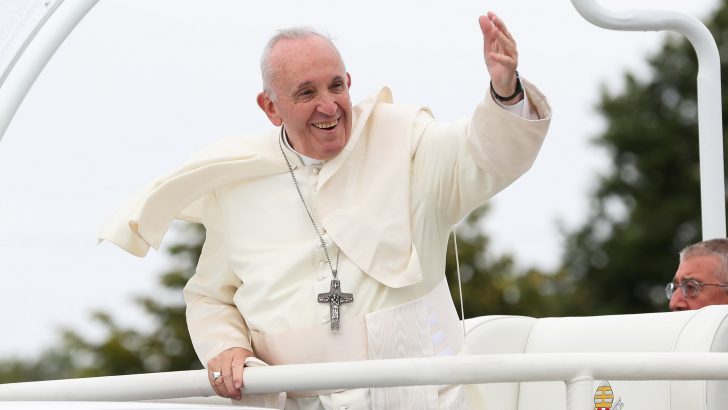In August, Pope Francis came to Ireland as part of the World Meeting of Families, visiting both Dublin and Knock. Prior to his arrival hundreds of volunteers had been working night and day to ensure that entire event was a success and an appropriate celebration for Irish families.
On August 21, all 26 of Ireland’s dioceses simultaneously celebrated the beginning of the festival in their own unique way – with the lead ceremony taking place in the RDS.
In the same location thousands of families attended the WMOF Pastoral Congress, listening to talks, meeting new people and sharing their faith. Despite the shaky start – given that speakers Archbishop of Boston, Cardinal Seán O’Malley OFM Cap and Cardinal Donald Wuerl cancelled their attendance unexpectedly – the event was a resounding success which saw 37,000 attendees from 116 countries.
There were about 6,500 people under the age of 18 and 15,000 pilgrims from overseas who were registered to attend. With musical acts, a focus on the environment, endless amounts of stalls and entertainment, and a full programme of speakers, there was plenty to enjoy. The programme of workshops, talks and discussions centred on the theme: ‘The Gospel of the Family: Joy for the World’.
On Saturday, August 25, some 38 years after he spent three months in Dublin as a Jesuit priest, Jorge Bergoglio returned to Dublin as Pope. He was welcomed by high-ranking State officials including Tánaiste Simon Coveney, Primate of All Ireland Archbishop Eamon Martin, Archbishop Diarmuid Martin and Irish Ambassador to the Holy See Emma Madigan.
Conflict
The Pontiff then travelled to Áras an Uachtaráin, where he was greeted by President Michael D. Higgins and discussed issues of mutual concern such as inequality, poverty, violent conflict and immigration.
President Higgins said he shared the Pope’s concern regarding “the globalisation of indifference”, with both men agreeing on the importance of protecting vulnerable communities and individuals, and on the need for measures to prevent and redress all forms of abuse of privilege and power.
The Pope then gave his first speech in Dublin Castle where he said the clerical abuse of young people in Ireland was a “betrayal of trust” by Church authorities and remains a source of “pain and shame” for the Catholic community. He also attacked our “throw-away culture” which strips the unborn of the right to life – a significant statement following the recent Irish referendum to legalise abortion.
“Or could it be that the growth of a materialistic ‘throw-away culture’ has in fact made us increasingly indifferent to the poor and to the most defenceless members of our human family, including the unborn deprived of the very right to a life?” he asked.
Following this short visit, the Pontiff praised marriage as being “about love that gives rise to a new calling” in the Pro Cathedral, where he spoke to engaged couples and newly-weds. He encouraged parents to pray with their children as a family, celebrate Christian feasts, speak of holy things and make space for Mary in family life, as well as living in deep solidarity with those who suffer and are at the edges of society.
Schedule
Next on his schedule, after touring the streets of Dublin, was visiting the Capuchin Day Centre, where the Pontiff payed tribute to the dignity of the homeless, and met with several families who were in need. After Francis’ presentation, co-director of the centre, Bro. Kevin Crowley, said: “Wherever he went he always made sure the poor were his priority and I think that is one of the greatest gifts for us here today that the Pope came to visit the centre and showed his great love for the poor and for the homeless.”
Last on the itinerary for the Pope on Saturday was the celebration of the Festival of Families in Croke Park. In an array of artistic displays, musical numbers, and family testimonies, a cross generational audience of over 80,000 pilgrims shared and rejoiced in their Faith. When the performances ended, Francis opened his address with the words “Dia diaobh”, and then spoke about the importance of the family, with an emphasis on parents baptising their children.
He called the Church the “family of God” and said baptised children are stronger than those who aren’t because it guarantees that they have the “strength of God within them”.
On his second and final day in Ireland, Francis ventured to the Marian Shrine in Knock and begged the Lord for forgiveness and for the intercession of Our Lady to heal clerical abuse survivors. He also referred to the separation of children from their mothers, in an apparent reference to Ireland’s Mother and Baby Homes. He was told in detail about the institutions in a private meeting with survivors of clerical sex abuse in Ireland, people who spent time in industrial schools, seminaries and Mother and Baby homes, in the residence of the Papal Nuncio.
Forgiveness
This theme was also addressed at Mass in Dublin’s Phoenix Park, where the Pontiff begged for forgiveness and issued a wide-ranging apology for the Church.
The Mass saw around 150,000 pilgrims from across the world, praying and celebrating in Faith and fellowship.
Francis said Christians face enormous challenges in bearing witness to their Faith, but must never be “swayed or discouraged” by those who resist it.
“Yet like St Columbanus and his companions, who faced icy waters and stormy seas to follow Jesus, may we never be swayed or discouraged by the icy stare of indifference of the stormy winds of hostility”.
Although it was predicted that around 500,000 would attend the event, spirits were not dampened by the encouraging words of hope, love and forgiveness of a Pope who was moved by the people of Ireland.


 Colm Fitzpatrick
Colm Fitzpatrick Pope Francis at WMOF 2018 held in Dublin, Ireland
Pic: MAXWELLS
Pope Francis at WMOF 2018 held in Dublin, Ireland
Pic: MAXWELLS 